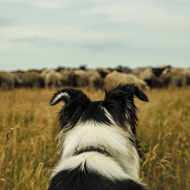Sheepdog travels 240 miles to get home

Pero is said to have bolted while working in the fields in Cockermouth. (stock photo).
A sheepdog is thought to have travelled 240 miles to his former home in Wales, arriving back home just 12 days after escaping from his new home in Cumbria.
Four-year-old working sheepdog Pero had been sent to a farm in Cockermouth, Cumbria, on a trial basis. But on 8 April, he bolted while out working in the fields and was nowhere to be found.
Pero's former owners, Alan and Shan James, were shocked when the dog appeared at their farm near Aberystwyth just 12 days later. The family now plan to keep Pero.
It is not known how he managed to make his way back home but Mrs James said he wasn't hungry or weak when he arrived, leading her to believe he may have sought help from kind strangers along the way.
The family are hoping to find out if anyone saw an unfamiliar black and white dog in the past two weeks.
Mrs James is quoted by BBC News as saying: "No one called us to say that they'd dropped the dog off, and even though he has a microchip no-ones's been in touch either to say that they've found him.
"It's a total mystery as to how Pero has managed to find his way back to us. We know that dogs can find their way home, but 240 miles is a long way to travel."



 The Veterinary Medicines Directorate (VMD) is inviting applications from veterinary students to attend a one-week extramural studies (EMS) placement in July 2026.
The Veterinary Medicines Directorate (VMD) is inviting applications from veterinary students to attend a one-week extramural studies (EMS) placement in July 2026.